15 Best Books on Solar Energy: A Comprehensive Guide for Renewable Energy Enthusiasts
If you’re a renewable energy enthusiast looking to expand your knowledge on solar energy, there’s something you probably don’t know: there are 15 books that can provide you with a comprehensive guide on the subject.
These books cover everything from the basics of how solar energy works to DIY installation and maintenance of solar power systems. Whether you’re a beginner or already have some knowledge in the field, these books offer valuable insights and practical advice.
So, if you’re ready to take your understanding of solar energy to the next level, there’s a wealth of information waiting for you in these 15 best books.
Key Takeaways
- ‘Running on Sunshine: How Does Solar Energy Work?’ is a great book for introducing young children to the concept of solar energy, using clear and understandable language.
- ‘DIY Solar and Wind Energy System’ is a helpful book for beginners interested in setting up their own off-grid solar and wind energy system, with clear explanations and visuals.
- ‘Off Grid Solar Power for Beginners (DIY Guide)’ is a practical and comprehensive resource for beginners, providing step-by-step instructions and detailed information on designing and installing a solar power system.
- ‘Mobile Solar Power Made Easy!: DIY Off-Grid Solar System Design and Installation’ empowers readers to build their own custom mobile solar power system, covering electrical theory, system components, and providing specific application examples.
Running on Sunshine: How Does Solar Energy Work? (Lets-Read-and-Find-Out Science 2)
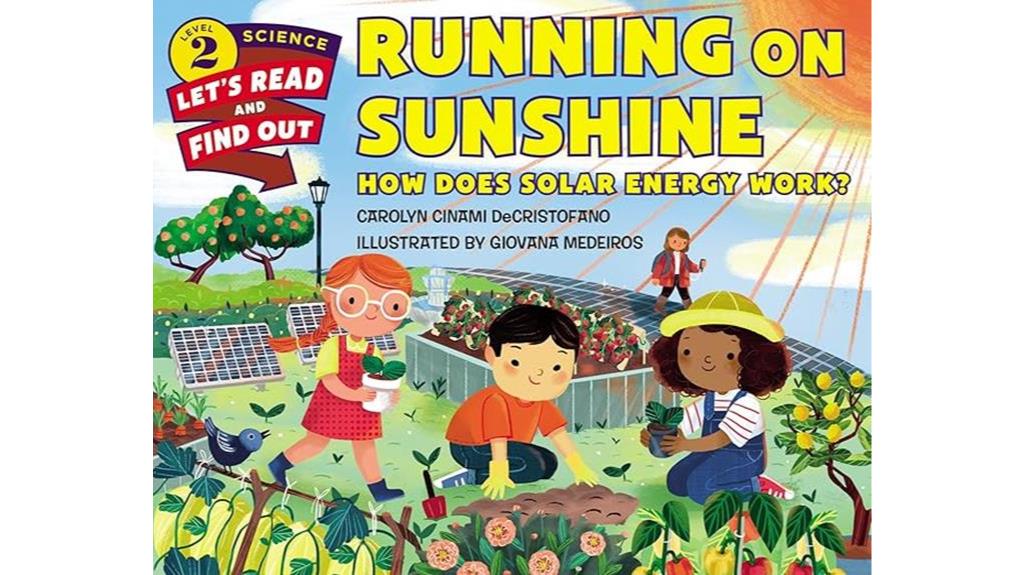
For those looking to introduce young children to the concept of solar energy, ‘Running on Sunshine: How Does Solar Energy Work?’ is the perfect choice. This book, part of the Lets-Read-and-Find-Out Science 2 series, uses correct and understandable language without resorting to cutesy terms. It focuses on explaining how solar energy works through the central character of a solar panel.
While initially, a 5-year-old girl wasn’t interested in the book because it dealt with a conceptual and technical topic, after a few weeks, she started asking to read it and now enjoys it. This positive impact is crucial because the parent wants their kids to learn about alternative energy, as they already own an electric car.
Overall, ‘Running on Sunshine: How Does Solar Energy Work?’ successfully captures the interest of young children and provides a valuable introduction to the world of solar energy.
Best For: Parents or educators who want to introduce young children (grades K-3) to the concept of solar energy in a correct and understandable way.
Pros:
- Uses correct and understandable language without resorting to cutesy terms.
- Focuses on explaining how solar energy works through the central character of a solar panel.
- Successfully captures the interest of young children and encourages reading instead of watching.
Cons:
- Some children may initially find the conceptual and technical topic of solar panels uninteresting.
DIY Solar and Wind Energy System
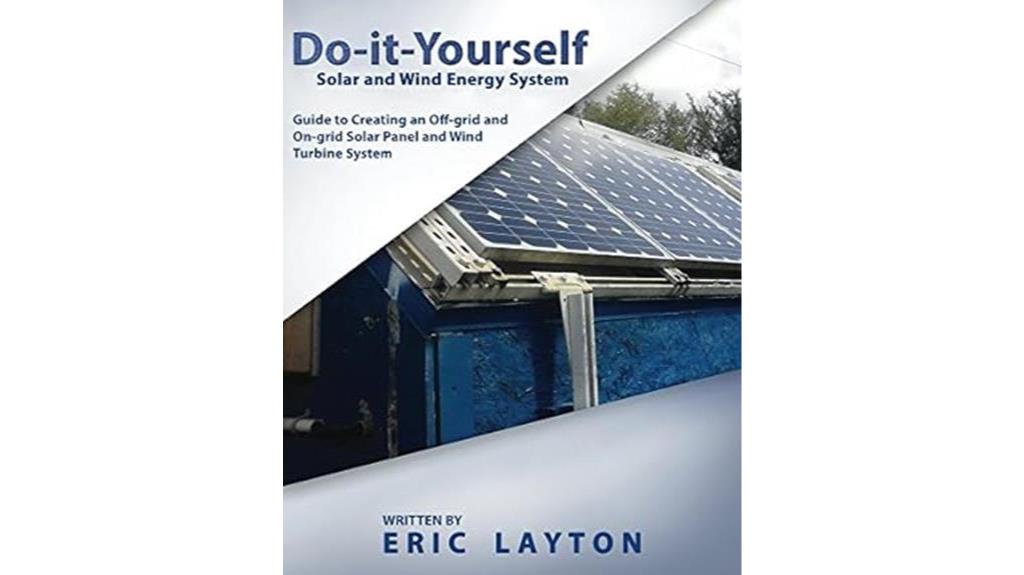
If you’re interested in setting up your own off-grid solar and wind energy system, the book ‘DIY Solar and Wind Energy System’ is a great choice. This book has received positive reviews for its clear explanations and helpful visuals, including many photographs and instructional videos available on YouTube.
Readers found the chapters to be concise yet informative, providing a solid starting point for beginners. However, some readers felt that the book lacked in-depth information, particularly on 48-volt systems. It was also noted that while the author has technical knowledge, their writing skills may not be on par with professional authors.
Despite these criticisms, many readers found the information in the book to be useful for beginners and recommended it as a starting point for those interested in building their own solar and wind energy systems.
Best For:
Beginners interested in setting up their own off-grid solar and wind energy system.
Pros:
- Clear explanations and helpful visuals.
- Concise chapters provide a solid starting point.
- Instructional videos available on YouTube.
Cons:
- Lacks in-depth information, particularly on 48-volt systems.
Off Grid Solar Power for Beginners (DIY Guide)
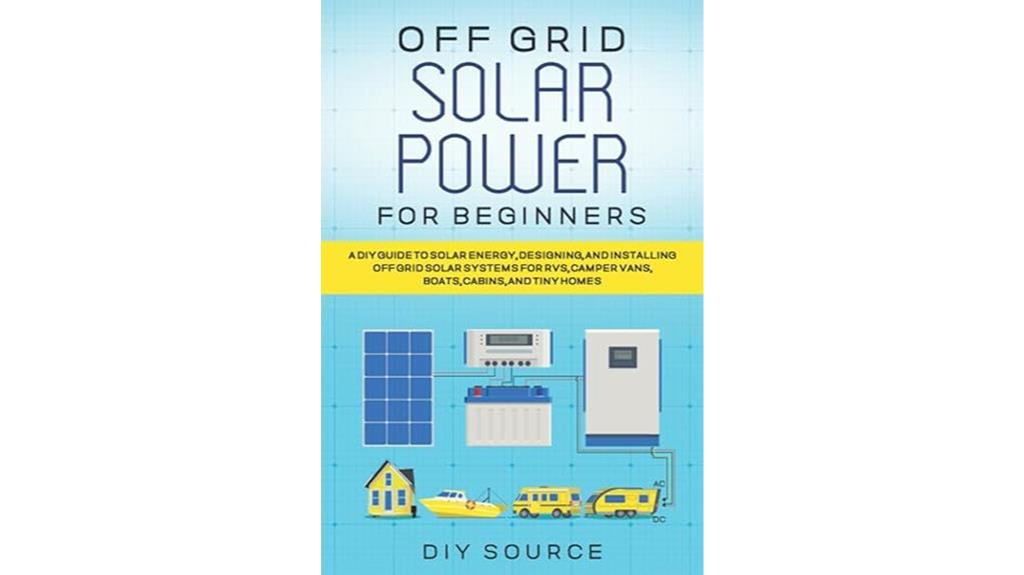
The ‘Off Grid Solar Power for Beginners (DIY Guide)’ is the perfect choice for those who are new to solar energy and want a practical and comprehensive resource to help them design and construct their own solar power system.
This book has received positive reviews and recommendations from readers who found it engaging and informative. It’s written for individuals with no electrical experience, providing clear explanations and even outlining the necessary tools and materials.
The content is practical and detailed, with step-by-step instructions, images, and diagrams to guide you through the process of connecting everything and setting up your own solar system. This book is suitable for beginners and has been praised for its useful illustrations.
It’s also beneficial for those interested in off-grid living, as it covers all aspects of designing and installing a solar power system.
Best For: Beginners who are new to solar energy and want a practical and comprehensive guide to designing and constructing their own solar power system.
Pros:
- Engaging and informative, written for individuals with no electrical experience
- Practical and detailed content, with step-by-step instructions, images, and diagrams
- Useful illustrations for easy understanding
Cons:
- Some readers may find the technical aspects of the book complicated
DIY Solar Power for Beginners: A Technical Guide for Grid Tied and Off Grid Solar Power Systems

Packed with comprehensive guidance and practical tips, ‘DIY Solar Power for Beginners: A Technical Guide for Grid Tied and Off Grid Solar Power Systems’ is a must-read for those seeking a user-friendly resource on solar energy.
This book has received positive reviews and recommendations from readers who found it to be a well-organized guide for deploying a solar energy system. It covers the basics of electricity, maintenance, and operation, making it suitable for beginners.
However, some readers felt that the book could have provided more specific details about connecting to the grid and component recommendations. Additionally, there were criticisms about the accuracy of solar costs and payback, as well as issues with grammar and formatting. Despite these minor flaws, readers found the content to be valuable and recommended it as a useful resource for learning about solar power.
Best For: Beginners interested in deploying a solar energy system for their home.
Pros:
- Comprehensive and well-organized guide for solar energy system deployment.
- Covers the basics of electricity, maintenance, and operation.
- Provides references to specific products with pros and cons.
Cons:
- Some inaccuracies in solar costs and payback information.
Mobile Solar Power Made Easy!: DIY Off-Grid Solar System Design and Installation
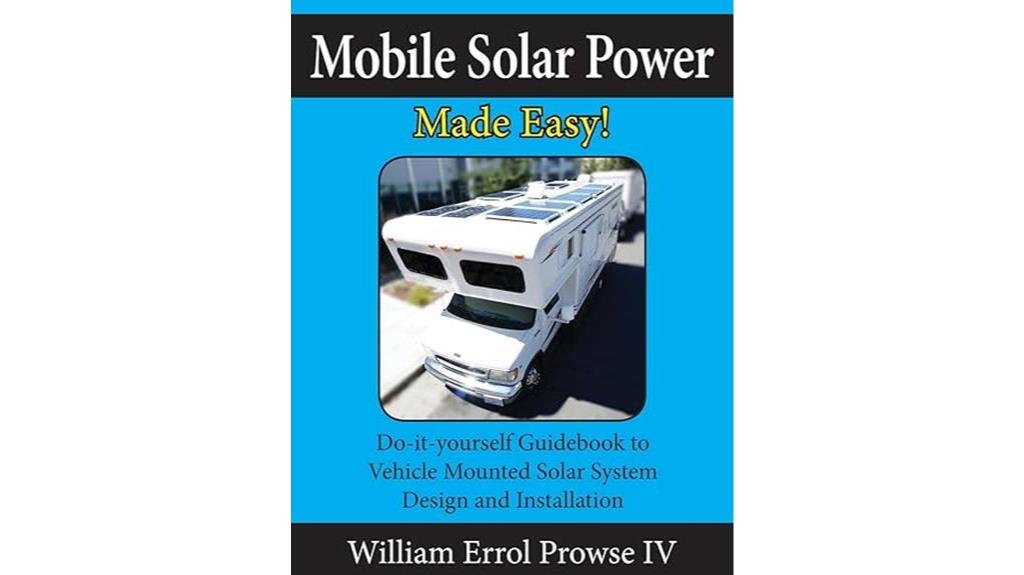
Discover how ‘Mobile Solar Power Made Easy!: DIY Off-Grid Solar System Design and Installation’ can empower you to confidently build your own custom mobile solar power system. This book has received positive reviews and recommendations for its practical and useful information. It covers basic electrical theory, system components, wire sizing, fuse placement, connections, tools, and techniques.
The author, Will Prowse, does a great job of explaining all facets of a solar install. The book provides specific application examples, such as upgrading a truck camper or building a solar generator. It also offers comprehensive instructions and includes diagrams that make the builds understandable. The associated website provides additional resources, including videos and links to recommended components.
While some readers found some information lacking, overall, this book is a valuable resource for anyone interested in building their own reliable, functional, and safe mobile solar power system.
Best For: Anyone who wants to build their own custom mobile solar power system that’s reliable, functional, and safe to operate.
Pros:
- Provides comprehensive information on basic electrical theory and system components
- Includes easy-to-follow instructions and diagrams
- Offers specific application examples and resources for recommended components
Cons:
- Some information on transfer switches and inverter wiring to an AC breaker panel is missing
DIY Solar Power for Beginners: Step-By-Step Guide to Design, Install, and Maintain Your Solar Energy System
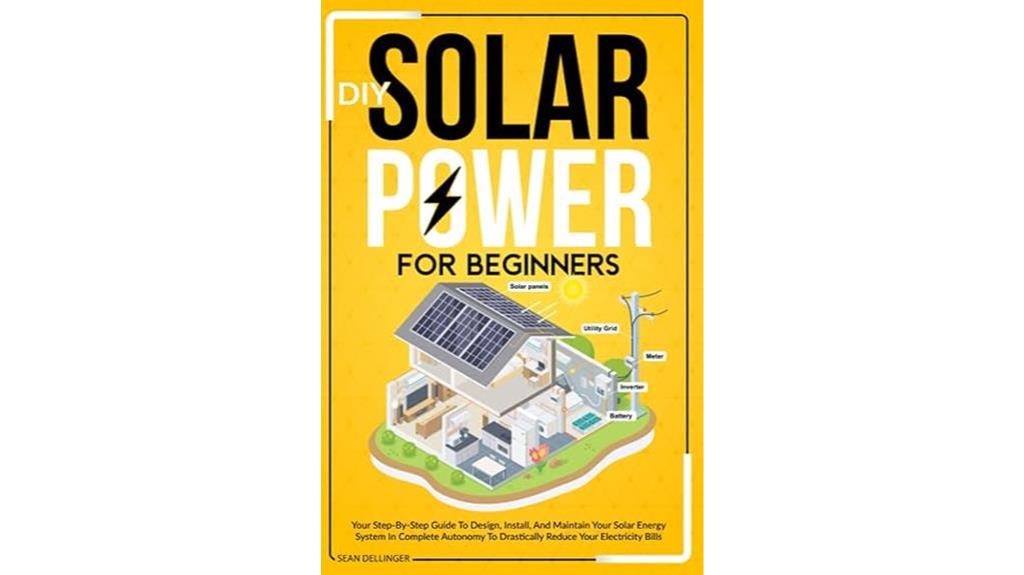
If you’re a beginner looking to design, install, and maintain your own solar energy system, the ‘DIY Solar Power for Beginners: Step-By-Step Guide’ is the perfect choice.
This book provides a comprehensive introduction to solar power and guides you through the process of implementing your chosen solar power method. It covers topics such as the tools and equipment needed for solar power, different types of solar power systems, and the advantages and disadvantages of having a solar system installed.
The book also offers clear and well-explained steps for designing and maintaining your own solar energy system, as well as methods of installation and maintenance. It provides practical information and includes pictures for better understanding.
In addition, the book helps you understand the benefits of solar power and how it can help reduce your electricity bills. Overall, it’s a valuable resource for beginners interested in DIY solar power.
Best For: Beginners interested in designing, installing, and maintaining their own solar energy system.
Pros:
- Provides a comprehensive introduction to solar power
- Offers clear and well-explained steps for designing and maintaining a solar energy system
- Helps reduce electricity bills
Cons:
- Poorly written and edited
Solar Power Your Home For Dummies
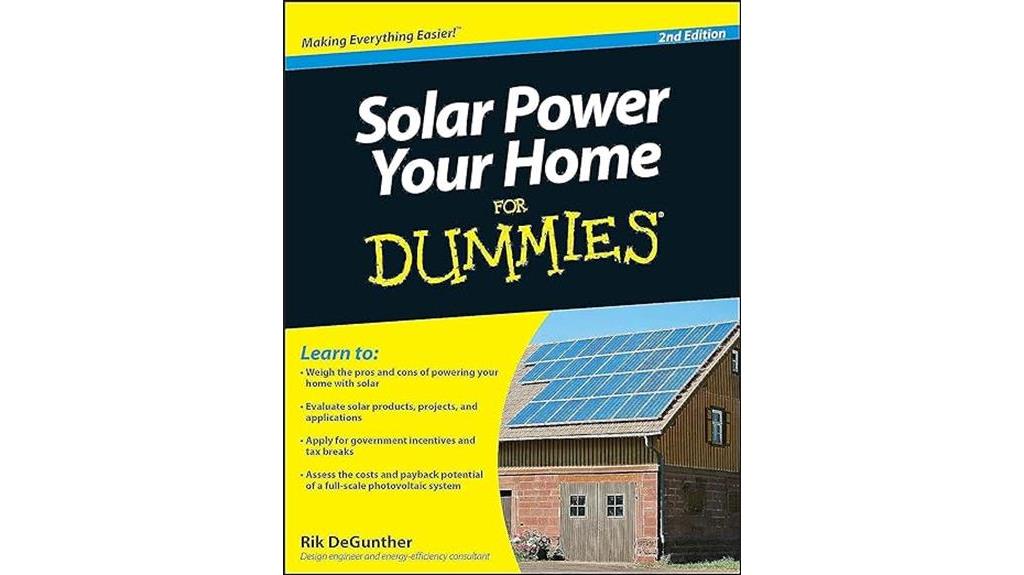
For those looking to get started with solar power, ‘Solar Power Your Home For Dummies’ provides a comprehensive guide on installing solar power systems and making informed decisions about renewable energy options.
This book is a great resource for beginners, offering clear instructions on how to install solar power systems and covering all the necessary components. It also provides valuable tips on energy efficiency and helps in deciding which type of energy to choose.
However, some criticisms of the book include an overemphasis on alternative energies and a lack of precise information on connecting and making solar panels and inverters work.
Despite these criticisms, ‘Solar Power Your Home For Dummies’ is still highly recommended for those with moderate knowledge and needs, as it offers a good starting point for learning about solar power and provides practical guidance for building a home with solar power.
Best For: Beginners and individuals with moderate knowledge who want to learn about solar power and install solar power systems in their homes.
Pros:
- Provides clear instructions on installing solar power systems.
- Covers all the necessary components and the correct way to install them.
- Offers valuable tips on energy efficiency and helps in deciding which type of energy to choose.
Cons:
- Overemphasizes alternative energies and lacks precise information on connecting and making solar panels and inverters work.
The Off Grid Solar Power Bible: Easy Illustrated DIY Guide to Install and Maintain Your Own Blackout-Free System
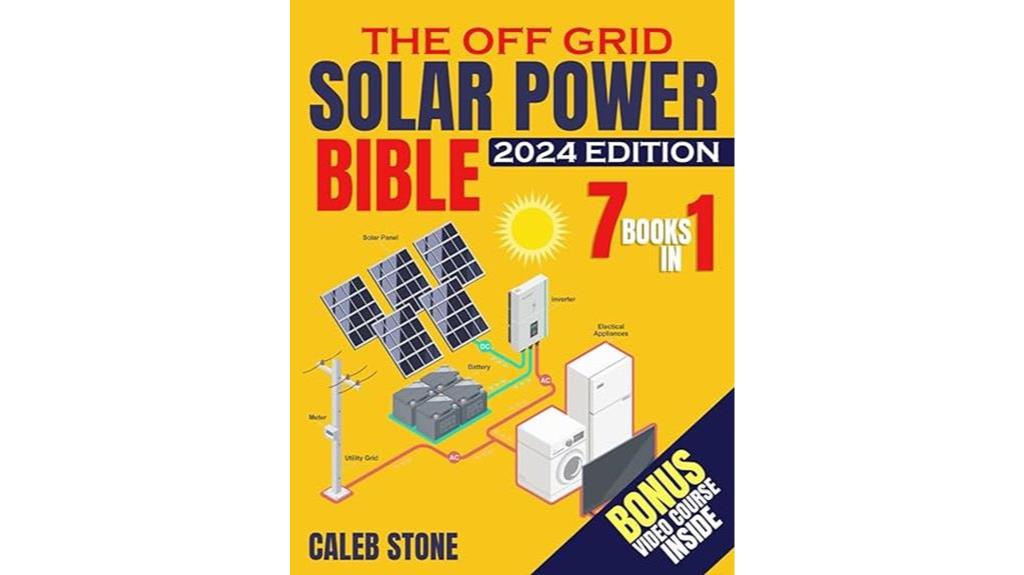
The Off Grid Solar Power Bible: Easy Illustrated DIY Guide to Install and Maintain Your Own Blackout-Free System is an essential resource for anyone seeking to become self-sufficient and independent with their solar power system.
This comprehensive book covers everything you need to know about going off-grid and becoming more independent. Whether you live in an urban area or plan to use solar power in your camper or RV, this book provides valuable information on the equipment needed, installation, and maintenance of off-grid solar power systems.
While there have been some criticisms about factual errors and logical inconsistencies in the book, many readers have found it to be a good introduction to solar power and appreciate the useful information, easy-to-understand diagrams, and interesting case studies. Overall, this book is a valuable guide for those looking to install and maintain their own blackout-free solar power system.
Best For: Individuals and families looking to become self-sufficient and independent with their solar power system.
Pros:
- Comprehensive guide with valuable information on going off-grid and installing solar power systems.
- Easy-to-understand diagrams and interesting case studies.
- Covers both urban areas and smaller scale setups like campers and RVs.
Cons:
- Factual errors and logical inconsistencies in some parts of the book.
Rourke Educational Media Atoms and Molecules Science Book for Grades 4-5 (My Science Library)
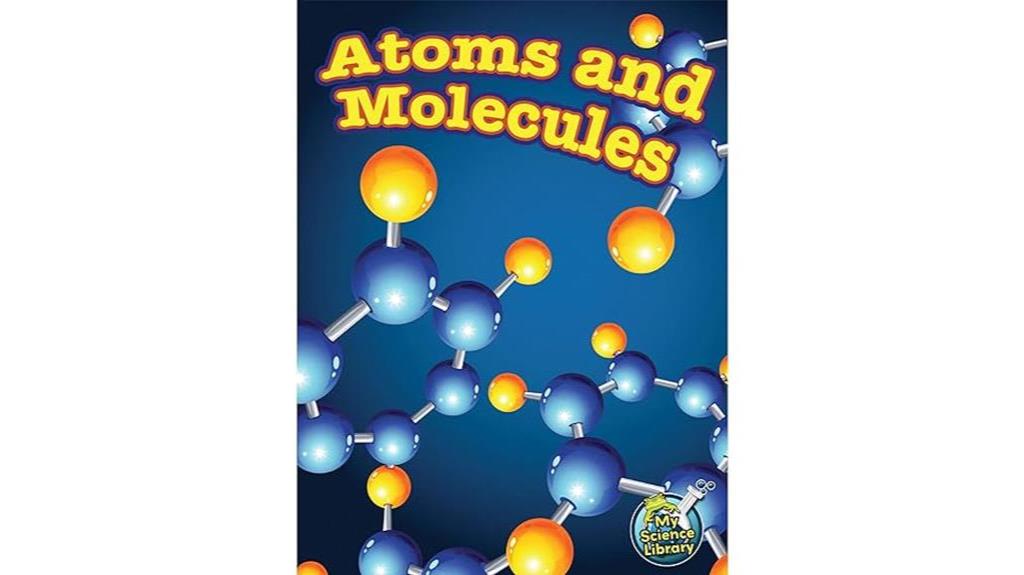
Get ready to dive into the world of atoms, molecules, and the wonders of science with the Rourke Educational Media Atoms and Molecules Science Book―perfect for younger children, homeschooling, and students in grades 4-5. This interactive book offers a wonderful introduction to atoms, molecules, and the Periodic Table of Elements. It also explores the future of nanoscience, providing a comprehensive understanding of these scientific concepts.
The book is well-written and easy to understand, making it ideal for younger readers. To aid in comprehension, there are numerous photographs and illustrations that support the text. Whether you’re looking to expand your knowledge or teach your children about the fascinating world of atoms and molecules, this book is a valuable resource that will engage and educate.
Best For: Younger children, homeschooling, and students in grades 4-5.
Pros:
- Offers a comprehensive understanding of atoms, molecules, and the Periodic Table of Elements.
- Well-written and easy to understand.
- Contains numerous photographs and illustrations to support the text.
Cons:
- Limited to grades 4-5, may not be suitable for older students.
Solar Power for Beginners All in One: A DIY Guide to Solar Energy Systems
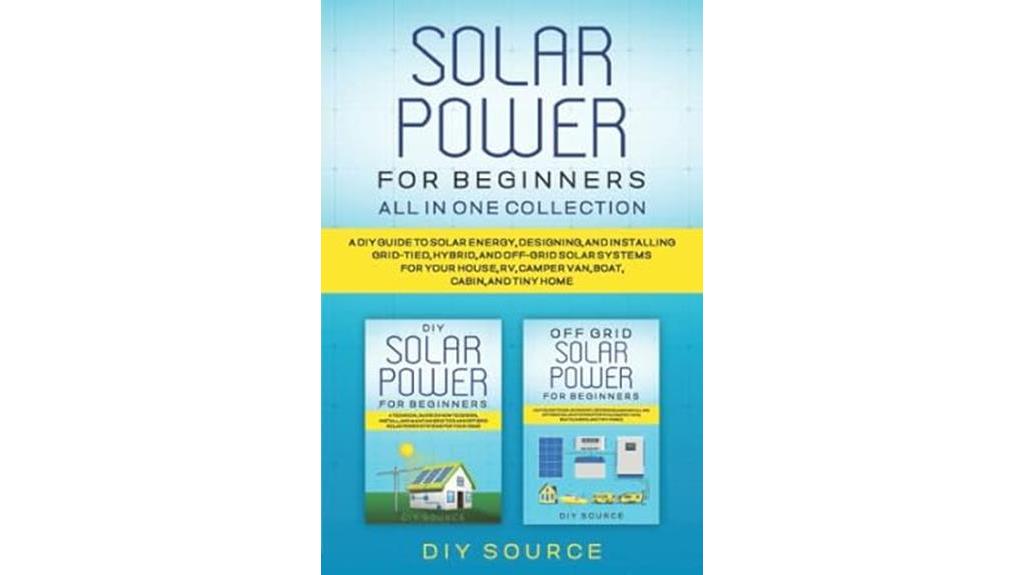
If you’re a beginner looking to learn all about solar energy systems, ‘Solar Power for Beginners All in One: A DIY Guide to Solar Energy Systems’ is the ultimate book for you.
This comprehensive guide provides step-by-step instructions and detailed information on how to use solar energy to power your home. It highlights the benefits of solar power, such as reducing reliance on harmful energy sources like coal and nuclear power plants, saving money on electricity bills, and benefiting the planet.
The book has received positive reviews, with readers praising its clear explanations and comprehensive coverage. However, there’s one negative review mentioning that it may not be basic or instructional enough for some readers.
Overall, if you’re looking for a beginner-friendly resource on solar energy systems, this book is a great place to start.
Best For: Beginners who are interested in learning about solar energy and how to use it to power their homes.
Pros:
- Provides step-by-step instructions and detailed information on solar energy systems.
- Highlights the benefits of solar power, including reducing reliance on harmful energy sources and saving money on electricity bills.
- Received positive reviews for its clear explanations and comprehensive coverage.
Cons:
- One negative review mentioned that it may not be basic or instructional enough for some readers.
Off Grid Solar Power Simplified
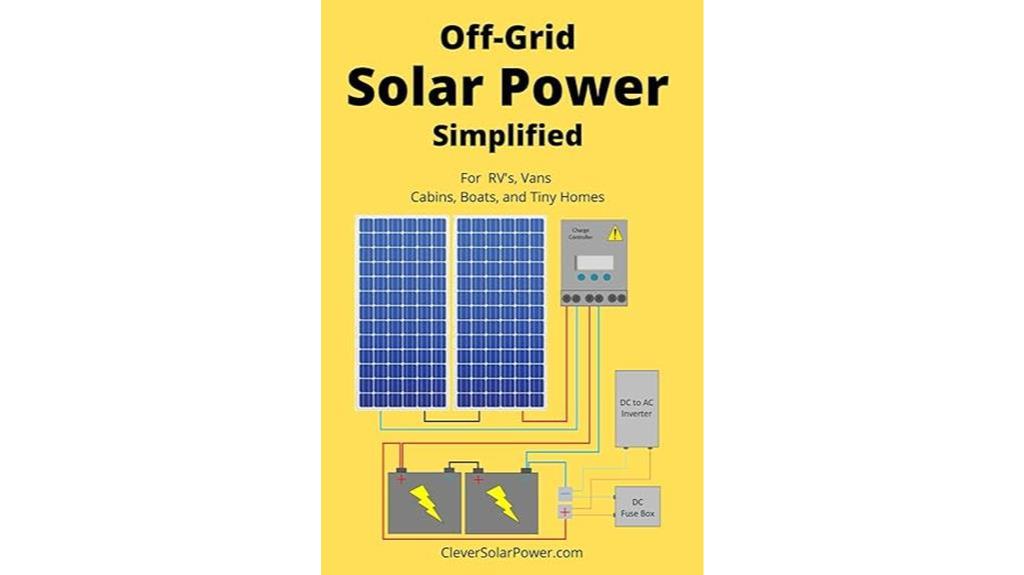
For those interested in off-grid solar power, the book ‘Off Grid Solar Power Simplified’ provides a comprehensive and practical guide to small solar installations.
This book has received positive reviews for being well-written and easy to read, with clear examples. It covers a wide range of topics, from electrical units and measuring equipment to more advanced concepts like batteries, sizing, panels, charge controllers, and inverters. Readers have found it to be very helpful and informative, making it a must-have resource for anyone interested in solar panels.
While the book offers comprehensive information on various components of a solar system, some readers have noted that there’s limited information on newer hybrid systems. However, overall, this book serves as a great introduction to off-grid solar and provides valuable knowledge for renewable energy enthusiasts.
Best For: Those interested in off-grid solar power and looking for a comprehensive guide to small solar installations.
Pros:
- Well-written and easy to read with clear examples.
- Covers a wide range of topics, from electrical units to advanced concepts.
- Provides valuable knowledge for renewable energy enthusiasts.
Cons:
- Limited information on newer hybrid systems.
DIY – Master Solar Faster Book 3: Make, Use, and Wire Green Energy
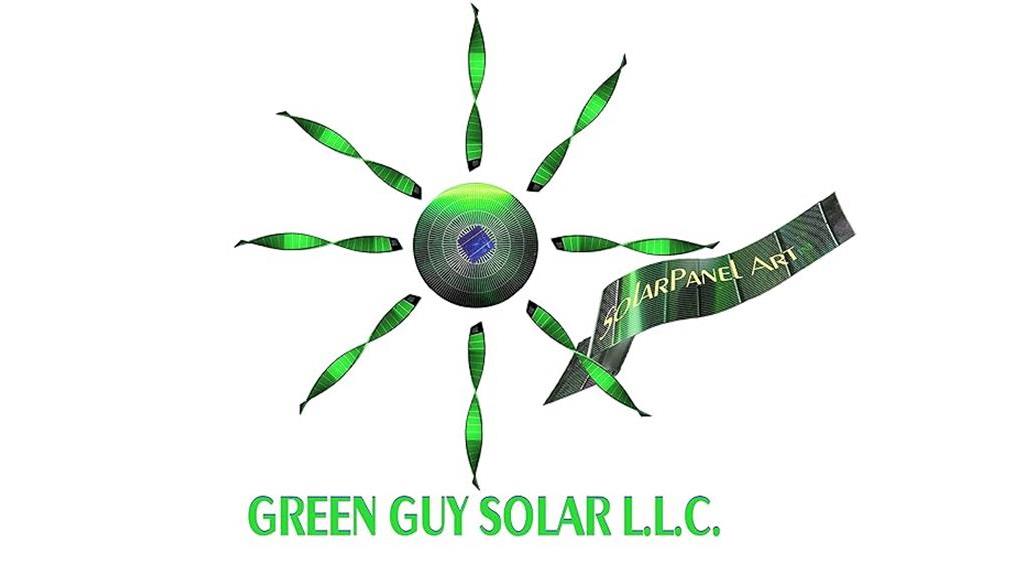
Discover how easy it’s to wire your house panel using low voltage and small inverters with the informative and user-friendly DIY – Master Solar Faster Book 3: Make, Use, and Wire Green Energy.
This book has received positive reviews for its ability to explain the process of hooking up solar panels with a grid-tie inverter. Readers have found the book to be informative and helpful, providing the information they were looking for. The author does a good job of explaining how to wire your house panel using low voltage and small inverters.
However, some negative reviews mention that the book is difficult to read on a small Kindle screen and has messy sentences. Additionally, the lack of hard facts, details, and formulas has been a disappointment for some readers. Despite these criticisms, the book offers different views and is a worthwhile resource for those interested in setting up a solar energy system.
Best For: Individuals interested in learning how to hook up solar panels with a grid-tie inverter and wire their house panel using low voltage and small inverters.
Pros:
- Provides easy-to-understand instructions on hooking up solar panels with a grid-tie inverter.
- Offers informative and helpful content for those looking to learn about solar energy systems.
- Presents different perspectives on setting up a solar energy system.
Cons:
- Difficult to read on a small Kindle screen with messy sentences.
Solar Photovoltaic (PV) Systems Quick-Card (Based on the 2020 NEC)
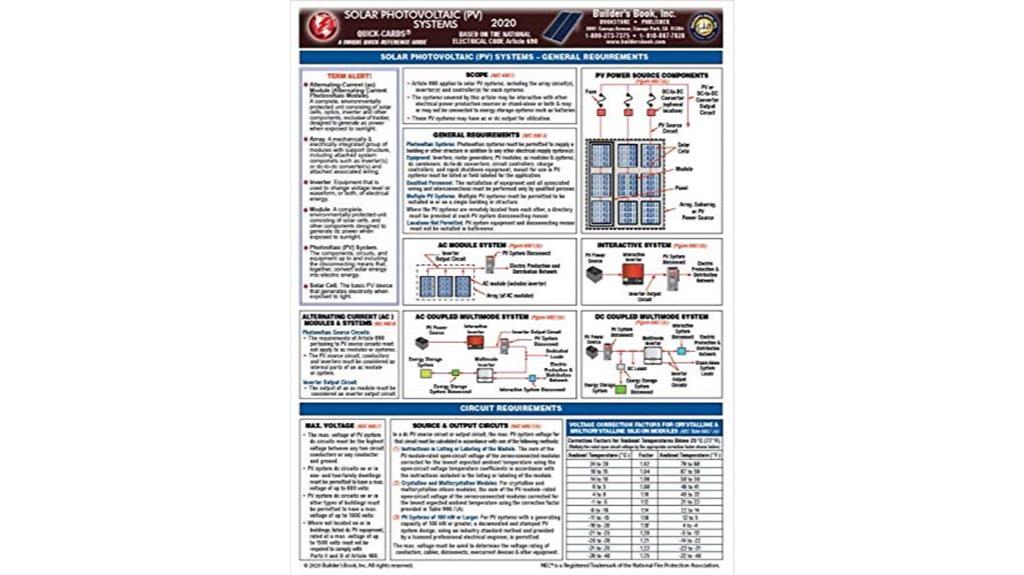
The ‘Best Books on Solar Energy’ is an ideal choice for those seeking a comprehensive guide on solar photovoltaic (PV) systems, including the invaluable ‘Solar Photovoltaic (PV) Systems Quick-Card (Based on the 2020 NEC)’.
This quick reference card has received positive reviews for its ability to provide quick answers and its laminated design. It’s considered a good reference guide with easy-to-understand charts and is worth the cost. However, some users have mentioned that it lacks comprehensive coverage, particularly in areas such as post-mounted arrays.
It’s important to note that this quick card focuses primarily on electrical codes related to solar PV systems and is geared towards professional installers. It may not provide the practical installation or operation pointers that some readers might be looking for. Additionally, it includes additional pages with information that some may consider unnecessary.
Overall, if you’re looking for a concise and handy resource for electrical codes in solar PV systems, the ‘Solar Photovoltaic (PV) Systems Quick-Card (Based on the 2020 NEC)’ could be a useful addition to your collection.
Best For: Professional installers and individuals seeking a quick reference guide for electrical codes in solar PV systems.
Pros:
- Provides quick answers and is laminated for durability.
- Contains easy-to-understand charts and is a good reference guide.
- Worth the cost for its usefulness and page printing quality.
Cons:
- Lacks comprehensive coverage, particularly for post-mounted arrays.
Solar Power For Beginners: Step-by-Step Guide to Installing and Maintaining Your Own Solar Power System
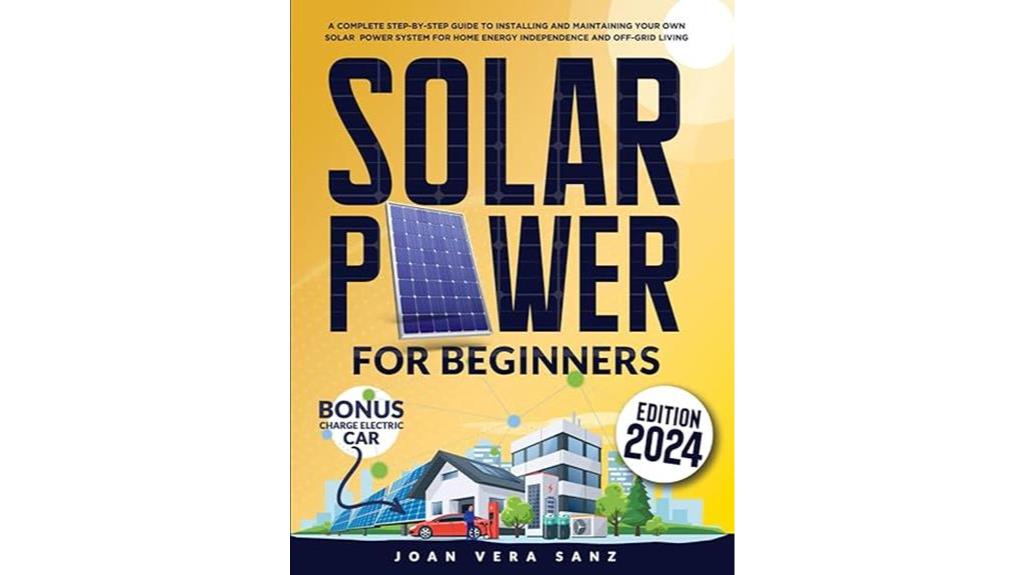
If you’re new to solar power and looking for a practical guide to installing and maintaining your own system, the ‘Best Books on Solar Energy’ offers a comprehensive and user-friendly resource.
This step-by-step guide provides all the information you need to install solar power correctly and ensure it works at its best. It covers the basics of solar power, starting with an overview of electricity and then diving into solar power specifically.
The book helps you choose the right type of solar panels and battery, provides a list of necessary materials, and offers detailed instructions on installation. Additionally, it includes techniques and strategies to maintain your solar power system effectively. With a bonus chapter on using solar energy to charge an electric car, this book is a valuable resource for beginners in the world of solar power.
Best For: Beginners who are new to solar power and want a comprehensive and user-friendly guide to installing and maintaining their own solar power system.
Pros:
- Provides step-by-step instructions and techniques for installing solar power correctly.
- Offers an overview of electricity and detailed information on solar power.
- Includes a bonus chapter on using solar energy to charge an electric car.
Cons:
- Fails to mention the negative aspects of solar power, such as energy consumption and manufacturing byproducts.
The Off Grid Solar Power Bible: Complete Guide to Off-Grid Solar Power Systems
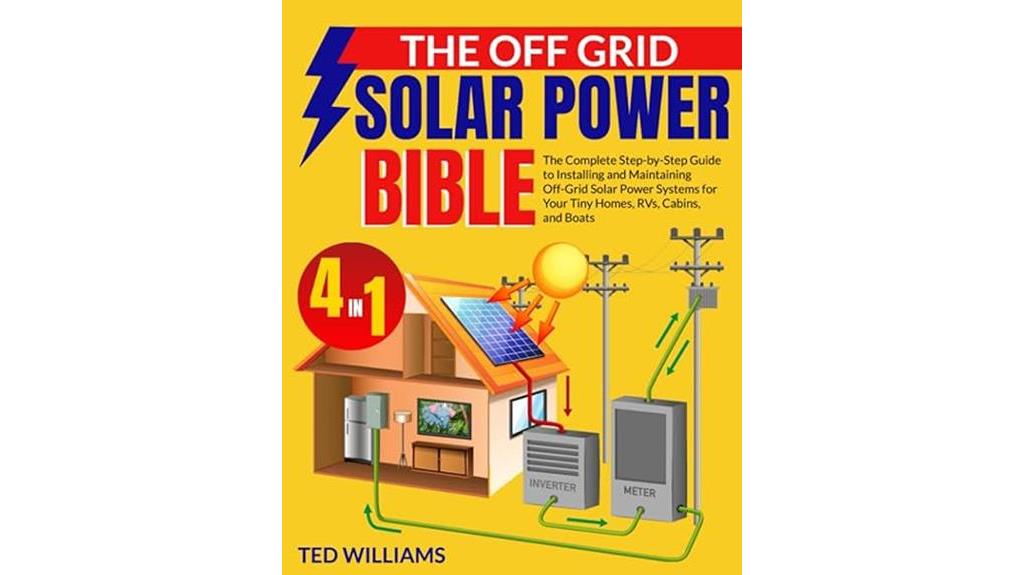
For those seeking a comprehensive guide on installing and maintaining off-grid solar power systems, ‘The Off Grid Solar Power Bible’ offers valuable insights and practical advice. However, it falls short of expectations considering its title and length.
With only 112 pages, half of which are blank or filled with white space, the book lacks the comprehensive information one would expect from a ‘Bible’ on the subject.
Furthermore, the absence of visuals, such as photos or illustrations, hinders its usefulness for readers. The book also lacks a thorough supply list or checklist, making it difficult for readers to gather the necessary materials and navigate the installation and maintenance process.
While it serves as a basic guide, it would benefit from streamlining the content by eliminating redundancy and unnecessary duplication. Overall, ‘The Off Grid Solar Power Bible’ does provide some insights, but it may not satisfy those seeking a truly comprehensive resource.
Best For: Owners of tiny homes, RVs, cabins, and boats looking for a basic guide on installing and maintaining off-grid solar power systems.
Pros:
- Provides valuable insights and practical advice on off-grid solar power systems.
- Offers a comprehensive overview of the installation and maintenance process.
- Serves as a basic guide for beginners in the field.
Cons:
- Lacks comprehensive information expected from a ‘Bible’ on the subject.
Factors to Consider When Choosing Books on Solar Energy
When choosing a book on solar energy, there are several factors you should consider.
- Make sure that the book covers the content and information you’re looking for, whether it’s a beginner’s guide or an in-depth analysis.
- Look for practical applications and real-life examples that can help you understand how solar energy works in practice.
- Check for recommended resources or endorsements from experts in the field to ensure you’re getting a reliable and valuable resource.
Factors to Consider
Consider the target audience of the book when selecting a book on solar energy, as different books cater to children, beginners, or professionals.
Look for books that provide practical, step-by-step instructions for installing and maintaining solar power systems. Comprehensive content is important, so seek books that cover various aspects of solar energy, including equipment, wiring, and system design.
Reader feedback and reviews can help gauge the practicality, usefulness, and clarity of the book’s content. Additionally, it’s beneficial to choose books that discuss the advantages and disadvantages of solar power, as well as the environmental impact and cost-effectiveness.
Choosing the Right Book
To find the right book on solar energy, you’ll want to take into account the intended audience and purpose of the book. Consider whether the book is geared towards kids, beginners, technical individuals, or professionals.
Look for books that offer practical and comprehensive content, with step-by-step instructions, clear explanations, and practical examples. Reader feedback and recommendations can help gauge the book’s effectiveness in engaging and educating.
Evaluate the book’s coverage of solar energy concepts, including solar panel functionality, off-grid living, alternative energy importance, and technical knowledge. Also, consider the book’s presentation, including visual aids, illustrations, and the overall organization of the content for effective learning.
Content and Information
Comprehensive and practical, books on solar energy provide step-by-step explanations and easy-to-understand content for beginners without prior technical knowledge.
These books cover a wide range of topics, starting from basic concepts and gradually progressing to more advanced information. Readers appreciate the well-written content, which is clear and concise, making it accessible to those new to the subject.
However, some books may lack in-depth technical information or practical application, which can lead to varied levels of reader satisfaction. Visual aids, illustrations, and practical examples are important components that enhance the learning experience and make the content more engaging.
Additionally, it’s essential to consider the target audience when selecting a book, taking into account factors such as age group or specific interests like off-grid living.
Practical Applications
When choosing a book on solar energy, it’s important to look for practical applications that provide step-by-step instructions and easy-to-understand content. You want a book that offers practical and informative content, with clear instructions for designing and constructing solar power systems. Look for books that are suitable for beginners, written in a way that’s accessible to individuals with no electrical experience.
Illustrations can be particularly helpful in understanding complex concepts. If you’re interested in off-grid living, consider books that provide detailed information on setting up solar power systems for off-grid living. Comprehensive information is also crucial, as you want a book that covers all aspects of solar electric systems, including technical aspects and considerations for designing and maintaining the system.
Positive reviews and recommendations can be a good indicator of the book’s usefulness and effectiveness.
Recommended Resources
Consider the target audience and specific focus of each resource when choosing a book on solar energy. Recommended resources cover a broad range of topics, from basic concepts to practical DIY guides. Reader feedback and reviews provide insights into the ease of understanding, practicality, and comprehensiveness of the resources.
It’s important to consider whether the book is suitable for beginners, children, those interested in off-grid living, or those seeking technical guidance. Some resources offer step-by-step instructions, practical examples, and personal experiences, while others may lack comprehensive information, visuals, or practical applicability.
To assess the relevance and usefulness of the recommended resources, reviewing user feedback and suggestions for improvement is recommended. By considering the target audience and the specific focus of each resource, you can find a book on solar energy that aligns with your needs and interests.
Conclusion
So there you have it, a comprehensive guide to the 15 best books on solar energy for all you renewable energy enthusiasts out there.
One interesting statistic to note is that solar photovoltaic (PV) systems have become 70% cheaper in the past decade, making solar power more accessible and affordable for individuals and businesses alike.
So grab a book, dive into the world of solar energy, and be a part of the renewable revolution!
Are you looking for a way to take your energy independence dreams off the back burner and into reality? Check out the free video presentation below to learn more about DIY Home Energy System by Jeff Davis!

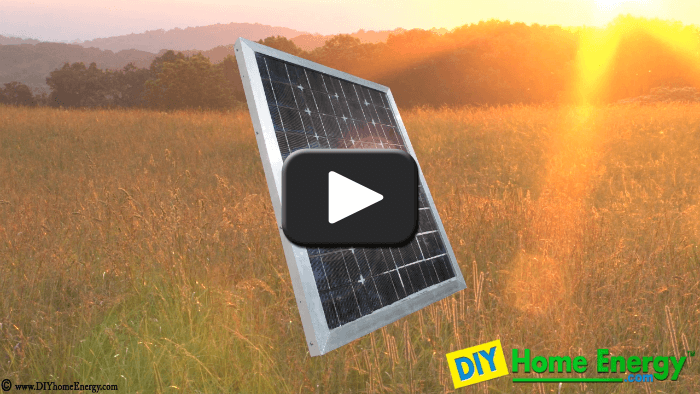


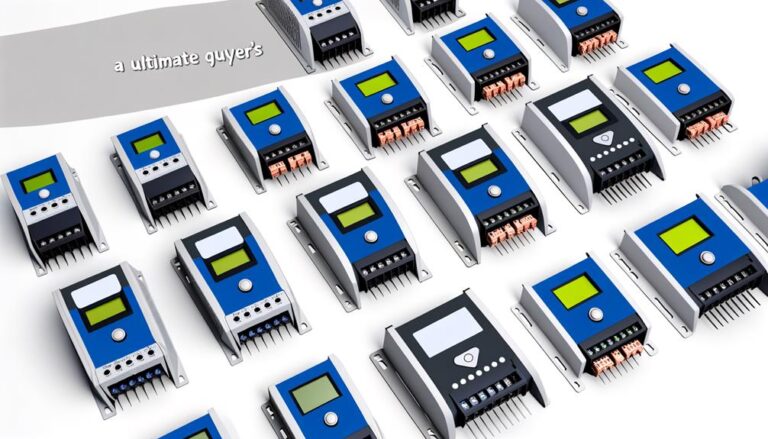



One Comment
Comments are closed.